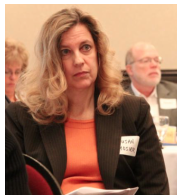
Susan Mosier, secretary of the Kansas Department of Health and Environment, will speak Saturday at a conference at Harvard University. She is part of a four-person panel on “Catalysts for a Generative Future – How Can Leaders Mobilize an Ecosystem?”
By Meg Wingerter
A Kansas Cabinet secretary will speak about the state’s plans to use technology to improve human services Saturday at a conference at Harvard University.
Susan Mosier, secretary of the Kansas Department of Health and Environment, will discuss the state’s plan to use data systems to find gaps or redundancies in the social services Kansans receive during the Health and Human Services Summit. She is scheduled to take part in a panel with three others during the summit, which was developed by a research initiative in the Technology and Entrepreneurship Center at Harvard.
The ultimate goal of the state’s technology plan is to make it easier to meet a family’s needs by connecting systems such as
Medicaid, under KDHE, with others like the Department of Commerce’s job training programs and educational assistance through the Kansas State Department of Education, Mosier said during an interview earlier this week.
“When you fill those gaps, you can really make a difference in the trajectory of a person’s life,” she said.
Mosier described a potentially 10-year technology plan in Kansas that started with automating enrollment in Medicaid. The process hasn’t been smooth thus far, however.
Technical problems connecting the Kansas Eligibility Enforcement System, or KEES, which processes Medicaid applications, with the system that disburses Medicaid payments produced higher-than-expected levels of errors, though Mosier said the error rate is down to about 1 percent.
The errors contributed to a backlog of Medicaid applications that left some providers, like nursing homes, without payment for months. The state reported 1,512 applications were in the backlog at the end of August but expects to clear it by Nov. 1.
Finding ‘actionable information’
Mosier anticipates a smoother process when the next stage of the technology plan rolls out in October 2017, though she said the process could be delayed if bugs come up. A tool purchased from Cerner will help the state to collect data about specific health issues, such as high blood sugar levels, and steer Kansans toward preventive care, she said.
“You need to be able to skinny down that big data and pull out targeted, actionable information,” she said.
New tools also will allow KDHE, the three managed care organizations that administer Medicaid in Kansas and individual doctors to look up what interventions are working, Mosier said. For example, they could find out if the tobacco quit line helps people to stop smoking or if they should put more emphasis on another program, she said.
The next phase of the technology plan isn’t scheduled to come out until spring 2019, assuming whomever replaces term-limited Gov. Sam Brownback decides to continue it.
A new Medicaid management system, the part of the system that disburses payments to providers, will allow beneficiaries to access more information about their medical history, such as immunization records, Mosier said. It also will include health information, such as tips for addressing chronic conditions.
Accenture a summit partner
Mosier’s panel appearance will be her second time speaking at the Health and Human Services Summit, which organizers say focuses on how collaborations involving government and private entities could improve the health of communities as families’ economic well-being.
“We have proven that helping low-income parents increase their educational attainment also positively affects their children’s emotional health and performance in school,” the summit agendasaid. “We have made the connection that families with stable housing and child care subsidies move up the income ladder faster and more sustainably.”
Mosier spoke in 2015 at the summit about using metrics in human services and “empowering team members.” A summary of the summit, compiled by sponsor organization Leadership for a Networked World, also pointed to KEES as a model for reducing employee time spent on tasks that could be automated.
The summit was held in October 2015, four months after the Medicaid portion of KEES went live. By December, a backlog had developed and providers complained that patients waited months for their applications to move forward.
An audit found some of the problems were caused by overly optimistic promises from contractor Accenture, and emails from state officials showed the company had pushed back its deadlines, apparently without notifying their counterparts at the state.
At the time, however, the summary listed praise for Kansas’ partnership with Accenture on its eligibility platform.
“Companies are laboratories for innovation, and collaborative experimentation facilitates progress,” it said.
Accenture was listed as one of four partners putting on this year’s summit. The fourth partner, American Public Human Services Association, lists Accenture as one of its 14 “platinum” level industry partner members.
The other panelists are Nick Macchione, director of the San Diego County Health and Human Services Agency, Susan Dreyfus, president and CEO of the Alliance for Strong Families and Communities, and Sarjoo Shah, CIO for human services and director for technology strategy for Oklahoma.
Meg Wingerter is a reporter for KHI News Service in Topeka, a partner in the Heartland Health Monitor team. You can reach her on Twitter @meganhartMC
